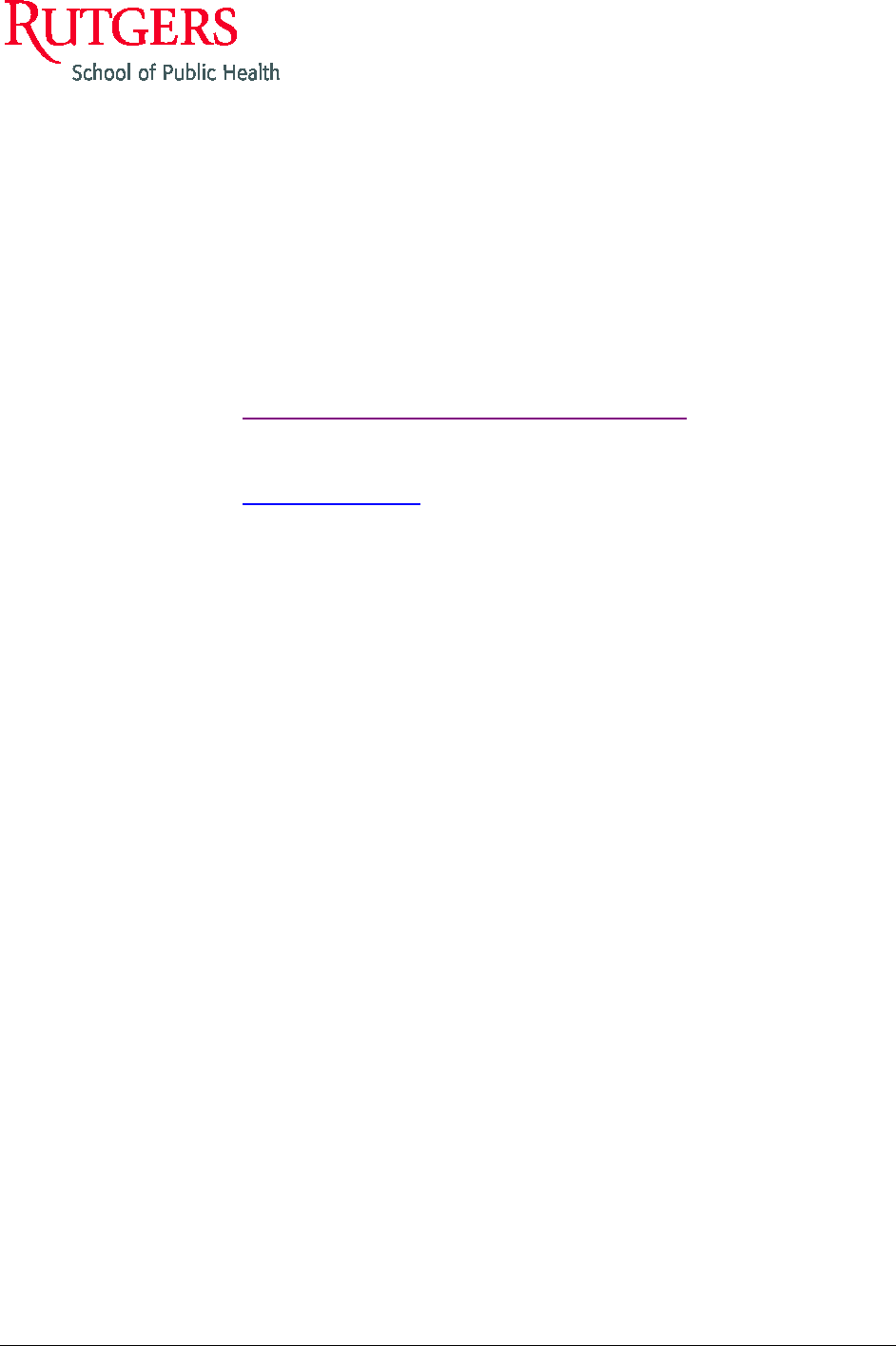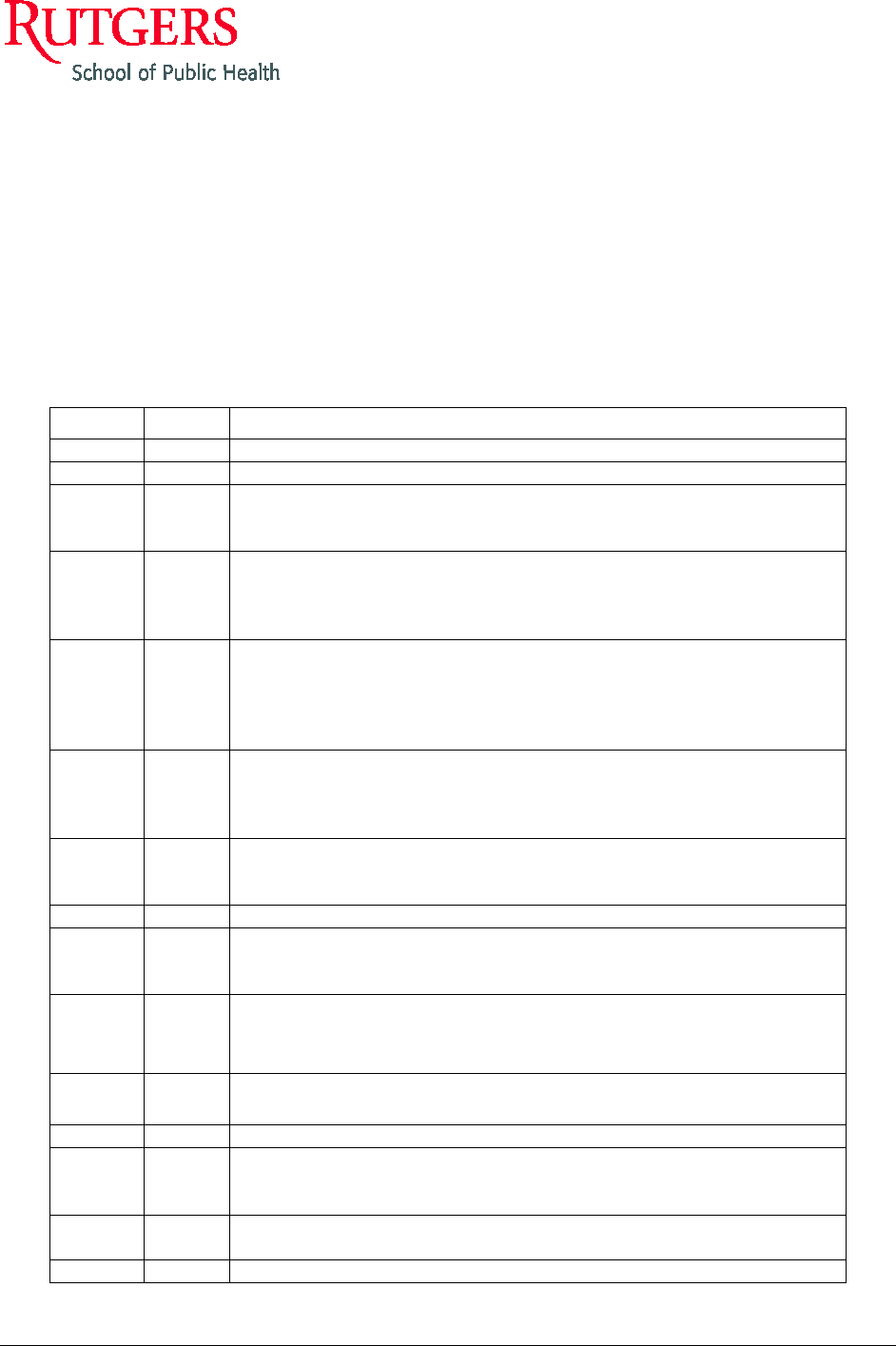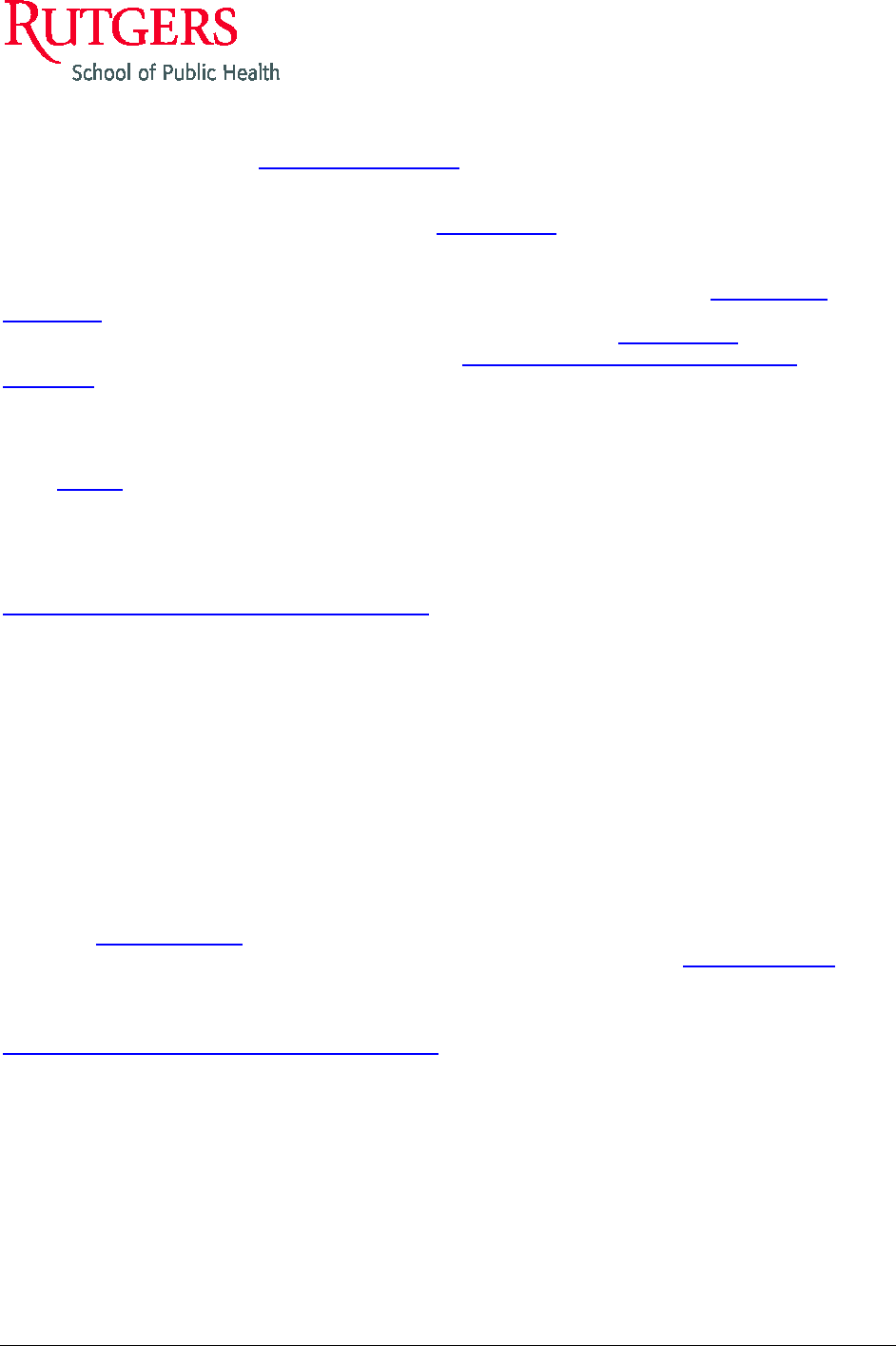
Course Title: Applied Longitudinal Data Analysis
Course Number: BIST 0650
Course Location: School of Public Health Building, Room 1A/B
Course Date & Time: Tuesday 3:00 pm – 5:30 pm
Course Instructor: Yong Lin, Ph.D., Professor, Biostatistics and Epidemiology
Department, School of Public Health, Rutgers University, Room 214 in
School of Public Health Building, Phone: (732)-235-5513, email:
linyo@sph.rutgers.edu
Office Hours: Tuesday 2:00pm – 3:00pm, and by appointment
Course Assistant: None
Course Website: canvas.rutgers.edu
Required Course Text: Peter Diggle, Patrick Heagerty, Kung-Yee Liang and Scott Zeger
(2002) Analysis of Longitudinal Data, Second Edition. Oxford
University Press, New York. ISBN: 978-0198524847
Garrett Fitzmaurice, Nan Laird and James Ware (2011) Applied
Longitudinal Analysis. Wiley; 2nd edition. ISBN13: 9780470380277
Additional/Supplemental Readings/Resources:
• Ramon C. Littell, George A. Milliken, Walter W. Stoup, Russell D. Wolfinger, Oliver
Schabenberger (2006). SAS System for Mixed Models, 2nd edtion. SAS Institute, Cary,
NC. ISBN: 978-1590475003
• Jose C. Pinheiro and Douglas M. Bates, Mixed Effects Models in S and S-Plus (2000),
Springer. ISBN: 978-1441903174
Course Description: Longitudinal data consists of multiple measures over time on a sample of
individuals. The analysis of longitudinal data requires much more sophisticated methodologies
due to the correlation introduced by repeated measurements. This course covers modern
statistical techniques for longitudinal data from an applied perspective. Emphasis will be on data
analysis and interpretation. Topics include characteristics of the longitudinal design, graphical
exploration of the mean and correlation structure, linear mixed effects models and multilevel
modeling, maximum likelihood and restricted maximum likelihood estimation, modeling the
variance-covariance structures, inference for random effects, logistic and Poisson mixed effects
model for binary and count data, marginal models and generalized estimating equations, and
model diagnostics. Analysis of real and substantial data sets using statistical software SAS and
R will be integrated throughout.
Selected Concentration Competencies Addressed: Each Department identifies
competencies for each degree offered. The competencies addressed in this course include:
Page 1 Rutgers, The State University of New Jersey

• Conduct appropriate statistical analysis of data to solve medical and public health
problems;
• Reinforce use statistical computer packages to organize, analyze, and report collected
data
• Design experimental and observational studies in biomedical, clinical and public health
research;
• Conduct complex statistical analyses for a broad range of applications
• Communicate the results of statistical studies both in writing and orally to investigators
and lay community members.
Please visit the Concentration webpages on the School of Public Health’s website at
sph.rutgers.edu
for additional competencies addressed by this course for other degrees and
concentrations.
Course Objectives: By the completion of this course, students will:
a) Identify the special features of longitudinal designs, describe how these features might
relate to the analysis. Manipulate the data in a way suitable for longitudinal analysis.
b) Graphically explore and present the longitudinal data.
c) Use SAS Proc mixed and R lme4 package to analyze continuous longitudinal data.
Correctly specify fixed and random effects and covariance structure. Interpret the SAS
and/or R output.
d) Use SAS Proc glimmix and nlmixed and R lme4 package to perform logistic and Poisson
mixed effects modeling for repeated binary or count data.
e) Use SAS genmod and R gee function to analyze repeated binary or count data using
generalized estimating equation techniques.
f) Predict the impact of missing data on standard statistical inference and for a particular
situation, be able to choose between the common approaches for handling missing
values.
g) Plan and design a longitudinal study. Use an appropriate method to analyze a particular
study and interpret the result.
Course Requirements and Grading:
• Lectures will be given each week.
• Six to seven homework will be assigned. Students are allowed to work in groups on
homework if they like, but no one should copy directly from someone else's paper.
• Both in-class midterm and final examinations will be open book.
• The R software can be downloaded free of charge from http://www.r-project.org
. The SAS
software can be leased through the university's software service, or use SAS OnDemand
for Academics https://welcome.oda.sas.com/login
The course grade will be based on homework assignments, the midterm exam, the final
exam, and class participation. The relative weight given to each of these components is
• Attendance, Participation and Class Activities 5%
• Homework 40%
• Midterm Exam 25%
• Final Exam 30%
Page 2 Rutgers, The State University of New Jersey

Total: 100%.
Grading Policy: 94 – 100 A
90 – <94 A-
87 – <90 B+
84 – <87 B
80 – <84 B-
77 – <80 C+
70 – <77 C
<70 F
Course Schedule: (Tentative)
Date
Class
Topic(s)
09/06
1
Definition, features, and objectives of longitudinal studies
09/13
2
Exploratory data analysis (EDA) and presentation of longitudinal data
09/20
3
Linear Models (I):
–Introduction, Mean and correlation models, Estimation
SAS Proc mixed
09/27
4
Linear Models (II):
–Fitting correlation models;
–Inferences in Mean (part 1): F-test, CI and LRT
R function lm, SAS Proc mixed
10/04
5
Linear Models (III):
–Inferences in Mean (part 2): F-test, CI and LRT;
–Inferences for Covariance/Correlation Models: ML estimates and
CIs for Covariance Parameters, ReML for Covariance Parameters
SAS Proc mixed, R package nlme
10/11
6
Linear Models (IV):
–Sensitivity to Correlation Model; –Generalized estimating equation
Linear Mixed Models (I): Introduction
SAS Proc mixe, genmod R function gee
10/18
7
Linear Mixed Models (II):
–Model Building and Model Diagnostics;
SAS Proc mixed, glimmix, R package nlme
10/25
8
Midterm exam
11/01
9
Generalized Linear Model (I):
– Marginal model and generalized estimating equation,
SAS Proc genmod, R package gee
11/08
10
Generalized Linear Model (II):
– Logistic for binary data and Log-Linear model for count data
SAS Proc glimmix, nlmixed, R packages gee, geepack
11/15
11
Generalized Linear (subject-specific) Mixed Effects Models (GLMM)
SAS Proc glimmix, genmod, nlmixed, R package lme4
11/22
Thanksgiving Recess
11/29
12
Generalized Linear Model (III): – Modeling association for binary data,
ordinal data, and sample size calculation
SAS Proc genmod
12/06
13
Missing data analysis in longitudinal study (I)
SAS Proc mi, mianalyze
12/13
14
Missing data analysis in longitudinal study (II);
Page 3 Rutgers, The State University of New Jersey

Final Review
12/20
15
Final Exam
Learning Management System: Canvas will be used extensively throughout the semester for course
syllabus, assignments, announcements, communication and/or other course-related activities. It is the
student’s responsibility to familiarize themselves with Canvas and check it regularly. If you have
difficulties accessing Canvas, please inform the instructor and Canvas Support
(help@canvas.rutgers.edu). Canvas is accessible at canvas.rutgers.edu
.
School of Public Health Honor Code: The School of Public Health Honor Code is found in the School
Catalog (sph.rutgers.edu/academics/catalog.html). Each student bears a fundamental responsibility for
maintaining academic integrity and intellectual honesty in his or her graduate work. For example, all
students are expected to observe the generally accepted principles of scholarly work, to submit their own
rather than another’s work, to refrain from falsifying data, and to refrain from receiving and/or giving aid
on examinations or other assigned work requiring independent effort. In submitting written material, the
writer takes full responsibility for the work as a whole and implies that, except as properly noted by use of
quotation marks, footnotes, etc., both the ideas and the works used are his or her own. In addition to
maintaining personal academic integrity, each student is expected to contribute to the academic integrity
of the School community by not facilitating inappropriate use of her/his own work by others and by
reporting acts of academic dishonesty by others to an appropriate school authority. It should be clearly
understood that plagiarism, cheating, or other forms of academic dishonesty will not be tolerated and can
lead to sanctions up to and including separation from the Rutgers School of Public Health.
Students with Disabilities: Rutgers University welcomes students with disabilities into all of the
University's educational programs. In order to receive consideration for reasonable accommodations, a
student must apply for Services by first completing a Registration Form with the Rutgers Office of
Disability Services (ODS) at ods.rutgers.edu. The student will also be required to participate in an ODS
intake interview and provide documentation. If reasonable accommodations are granted, ODS will provide
you with a Letter of Accommodations which should be shared with your instructors as early in your
courses as possible.
Commitment to Safe Learning Environment: The Rutgers School of Public Health is committed to
helping create a safe learning environment for all students and for the School as a whole. Free
expression in an academic community is essential to the mission of providing the highest caliber of
education possible. The School encourages civil discourse, reasoned thought, sustained discussion, and
constructive engagement. Provocative ideas respectfully presented are an expected result. An
enlightened academic community, however, connects freedom with responsibility. The School
encourages all students to disclose any situations where you may feel unsafe, discriminated against, or
harassed. Harassment or discrimination of any kind will be not tolerated and violations may lead to
disciplinary actions.
Student Well-Being: The School of Public Health recognizes that students may experience stressors or
challenges that can impact both their academic experience and their personal well-being. If the source of
your stressors or challenges is academic, students are encouraged to discuss these challenges and
circumstances with their instructor, if they feel they may need additional support or temporary
accommodations at the beginning or during this course. The course instructor may consider making
reasonable temporary adjustments depending on the student’s situation. For personal concerns or if
additional support is needed, students may reach out to the Office of Student Affairs
or any of the
appropriate referral resources listed on the SPH Student Connect Canvas page.
Reporting Discrimination or Harassment: If you experience any form of gender or sex-based
discrimination or harassment, including sexual assault, sexual harassment, relationship violence, or
stalking, know that help and support are available. You may report such incidents to the
RBHS Title IX
Office or to the School of Public Health’s Office of Student Affairs. Rutgers University has staff members
trained to support survivors in navigating campus life, accessing health and counseling services,
Page 4 Rutgers, The State University of New Jersey

providing academic and housing accommodations, and more. If you experience any other form of
discrimination or harassment, including racial, ethnic, religious, political, or academic, please report any
such incidents to the School’s Office of Student Affairs
. The School strongly encourages all students to
report any incidents of discrimination or harassment to the School. Please be aware that all Rutgers
employees (other than those designated as confidential resources such as advocates, counselors, clergy
and healthcare providers as listed in Appendix A to
Policy 10.3.12) are required to report information
about such discrimination and harassment to the School and potentially the University. For example, if
you tell a faculty or staff member about a situation of sexual harassment or sexual violence, or other
related misconduct, the faculty or staff member must share that information with the
RBHS Title IX
Coordinator. If you wish to speak to a confidential employee who does not have this reporting
responsibility, you can find a list of resources in Appendix A to University Policy 10.3.12. For more
information about your options at Rutgers, please visit Rutgers Violence Prevention and Victim
Assistance.
Overview of School Policies: Academic and non-academic policies and procedures, such as Auditing a
Course, Retaking Courses, Grade Grievance and others that cover registration, courses and grading,
academic standing and progress, student rights and responsibilities, graduation and more may be found
under Policies
on the School of Public Health website. Below are select specific policies; however,
students are responsible for keeping informed about academic and non-academic policies and
procedures beyond those noted on this syllabus.
Graduate Student Computer Policy: Students are required to possess a personal laptop, no older than
approximately two years, that must meet minimum requirements which may be found online at:
sph.rutgers.edu/student-life/computer-support.html
Policy Concerning Use of Recording Devices and Other Electronic Communications Systems:
When personally owned communication/recording devices are used by students to record lectures and/or
classroom lessons, such use must be authorized by the faculty member or instructor who must give either
oral or written permission prior to the start of the semester and identify restrictions, if any, on the use of
mobile communications or recording devices.
Policy Concerning Use of Turnitin: Students agree that by taking this course all required papers may
be subject to submission for textual similarity review to Turnitin.com (directly or via learning management
system, i.e. Canvas) for the detection of plagiarism. All submitted papers will be included as source
documents in the Turnitin.com reference database solely for the purpose of detecting plagiarism of such
papers. Use of the Turnitin.com service is subject to the Usage Policy posted on the Turnitin.com site.
Students who do not agree should contact the course instructor immediately.
Withdrawal/Refund Schedule: Students who stop attending their course(s) without submitting a
completed Add/Drop Course
form will receive a failing grade. Furthermore, students dropping to zero
credits for the semester are considered withdrawn and must submit a completed Leave of Absence form
from the School of Public Health’s Office of Student Affairs. The School of Public Health refunds tuition
only. Administrative and technology fees are non-refundable. You may find the Withdrawal/Refund
Schedule on the School of Public Health website at:
sph.rutgers.edu/academics/academic-calendar.html
Page 5 Rutgers, The State University of New Jersey
